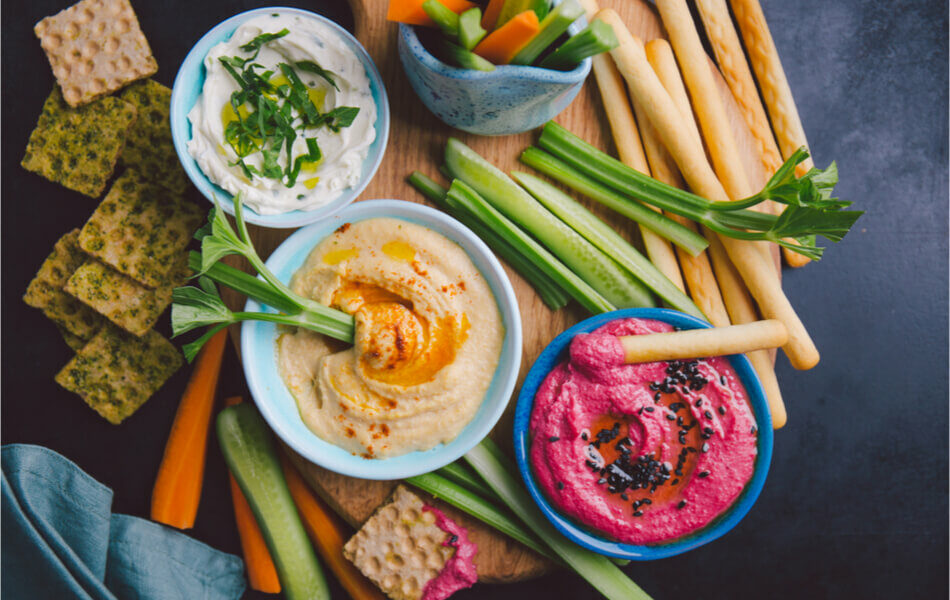Is Hummus Good For Weight Loss? Nutrition Facts and Drawbacks
Hummus is a savory dish usually eaten as a dip or spread. This article will discuss how hummus affects weight loss, its nutritional facts, benefits, and drawbacks.

Hummus is a traditional dish popular in Middle Eastern cuisines, dips, and spreads. Millions of people enjoy it worldwide, dip it with sauces, sandwiches, or eat it alone.
It is a tasty dip and a great alternative for adding flavor to dishes. You can dip veggies, pita chips, or pretzels in it for a healthy snack. If you are a huge fan of hummus, you probably wonder, “Is hummus good for weight loss? What are the associated health benefits and drawbacks of this tasty dip?”
Hummus is a versatile food linked to many health benefits, and this article will discuss the benefits of hummus and whether it is suitable for weight loss.
What Is Hummus?
Hummus is a delicious spread that originated in the Middle East. It is made by blending the main ingredients in a food processor: tahini paste, olive oil, chickpeas, lemon juice, salt, and garlic. You can also use a blender.
Some people, however, use black beans, lentils, or soybeans as a replacement for chickpeas in hummus as they have more minerals and protein than chickpeas.
People usually consume hummus as a dip with pitta bread in Middle Eastern cuisines. In the United States, people use it as a snack or side dish. It can also be used as a spread instead of butter or made into pasta sauce.
You can make your own hummus or buy it from the store. Almost all store-bought hummus brands are made from plant-based products, making them an excellent addition to a vegetarian or vegan diet.
Is Hummus Good for Weight Loss?
Eating hummus helps one to lose weight gradually thanks to its excellent nutritional profile. Studies showed that people who consumed chickpeas or hummus regularly lost weight and were 53% less likely to be obese. They also lowered their waist circumference by 2.2 inches.
Another research showed that people who regularly consume chickpeas over white bread lose weight and have fewer hunger pangs. They also help lower body mass index and accelerate weight loss.
Among the dietary properties of hummus that contribute to weight loss are the high amount of protein and dietary fiber. Chickpeas are high in plant-based protein, which helps control appetite and allows you to feel full for longer.
The dietary fiber in hummus also helps curb calorie intake by reducing appetite as it helps lower levels of the hunger hormone ghrelin.
Is hummus good for you?
Hummus can be good for you, depending on your health goals and dietary needs. It is packed with vital nutrients such as proteins, soluble fiber, and unsaturated fats. Ingredients in hummus can reduce inflammation and ensure better digestion.
Chickpeas, the main ingredient in hummus, are rich in protein and fiber, folate, magnesium, iron, and vitamin A, E, and C.
It is an excellent food choice for people with allergies and intolerances, as it is dairy, nut, and gluten-free. It is an excellent source of antioxidants and, as said before, helps fight inflammation and improve overall health.
5 Health Benefits of Hummus
There are unlimited options for enjoying hummus, and it has numerous associated benefits. Not only is hummus delicious, but it also has many nutritional benefits.
Read on to learn more about its health benefits and how to incorporate it into your diet for optimal health results.
#1 Good for digestive health
Hummus has a high fiber content which considerably helps in improving digestive health. Dietary fiber helps soften and add bulk to stool, making it easier to pass from the gut.
Fiber also helps feed the healthy gut bacteria and suppresses the growth of harmful bacteria. These gut bacteria may also convert some of the fiber in hummus to short-chain fatty acids, which help nourish colon cells.
The nourishing of colon cells lowers the risk of contracting colon cancer or other related health problems.
#2 Balances blood sugar levels
Eating hummus helps in blood sugar management, thanks to the high amount of fiber it contains. Fiber-rich foods help control blood sugar and reduce the risk of developing type 2 diabetes.
Hummus made from chickpeas has a low glycemic index. The glycemic index of a food is a measure of the ability of food to raise blood sugar. Foods with a high glycemic index are quickly absorbed in the digestive system leading to a spike in blood sugar levels.
Chickpeas are also rich in fiber, resistant starch, protein, and antinutrients, which slow down the digestion of carbs. Hummus also contains good fats, which slows down the absorption of carbs in the gut allowing for a slow, steady release of sugar in the bloodstream.
#3 Great if you have food allergies
A lot of people have allergies and food intolerances. However, virtually everyone can enjoy hummus without worrying about allergic reactions.
Hummus does not contain common allergens like lactose, gluten, and nuts and is thus a good alternative for people with conditions like nut allergies, celiac disease, and lactose intolerance.
Though hummus is free from these common allergens, it would be best to check the complete list of ingredients as some brands may have preservatives or additional ingredients.
Keep in mind that hummus also has sesame seeds (as tahini paste is made from them), and if you are allergic to them, it would be best to avoid hummus completely.
It would be best if you do not overconsume hummus as chickpeas are high in raffinose, a short-chain carbohydrate that may cause constipation or bowel irritation when excessively consumed.
Generally, hummus is an excellent food choice for almost everyone.
#4 Source of calcium
Chickpeas and sesame seeds in hummus are a good source of calcium for your foods. Calcium plays a vital role in the growth, development, and maintenance of healthy bones.
It helps prevent osteoporosis and loss in bone density in females experiencing menopause and aging males. Calcium also helps proteins in stimulating muscle contraction. It also plays a key role in the blood clotting process.
Calcium’s role in muscle contraction helps relax the smooth muscles around blood vessels, and studies show that it helps lower blood pressure. Consuming hummus helps meet your body’s calcium needs and improve overall health.
#5 Contains heart-healthy fats
Hummus contains healthy monounsaturated fats, which help minimize the risk factors of heart diseases. Regular consumption of a diet rich in legumes, such as chickpeas, lentils, or beans, helps reduce bad cholesterol by about 5%.
Other than chickpeas, hummus contains olive oil, which helps reduce the risk of heart disease. Olive oil has anti-inflammatory properties reducing the risk of chronic diseases.
Chronic inflammation is among the leading causes of arthritis, Alzheimer’s, and type 2 diabetes. Olive oil is also the only monounsaturated fat associated with a reduced risk of stroke.
What to Eat With Hummus for Weight Loss
You can make nutritious, low-calorie hummus and combine it with healthy foods to boost metabolism and accelerate fat loss. You can also prepare your hummus with avocado and serve it with veggies, chips, toast, or crackers. If you are looking for a super healthy snack, try eating hummus with cucumber, carrots, and celery sticks.
You can dilute hummus with lemon juice and water to make hummus dressing. Avocado hummus is healthier than traditional hummus as it is richer in monounsaturated fats.
When eating it as a snack, you can add one tablespoon of hummus to vegetables such as red pepper, cucumber, or carrot sticks. You can have up to 4 tablespoons served with crunchy veggies for lunch or dinner.
FAQs
Below are the answers to the frequently asked questions concerning hummus for weight loss.
Hummus is an excellent source of plant-based protein, making it a good option for people on a vegan and vegetarian diet. Enough protein in the diet is necessary for muscle growth, recovery, and improving the body’s immune function.
Hummus is not fattening when correctly incorporated into a weight loss plan. Although hummus is generally healthy, the calories can rack up fast if you overeat it. Like any other food, it is advisable to check how much hummus you eat per serving to avoid weight gain.
Hummus is a healthy food that easily fits into any dietary plan. It is rich in nutrients and contains proteins, B vitamins, fiber, calcium, iron, and natural fats. Its diverse nutrient profile accounts for many benefits and promotes healthy eating.
Hummus contains fiber-full chickpeas and monounsaturated fats, both of which help lower cholesterol levels. A healthy dose of fiber and protein also boosts your metabolism, lowering your cholesterol levels.
Yes, hummus is a good source of fiber necessary for improving digestive health. Fiber leaves you more satiated after eating, reducing the calories you consume between meals, leading to weight loss.
A Word From Our Nutritionist
The ingredients in hummus are linked to impressive benefits such as fighting inflammation, regulating insulin levels, and improving digestive health.
Hummus forms part of a nutritious diet as it boosts protein, fiber, and healthy fats intake. When choosing store-bought hummus brands, check for those without chemicals and fillers to avoid health complications.
Though hummus is not the ultimate remedy for losing weight, it perfectly fits a weight loss diet. Please do not go beyond recommended serving sizes as it may not benefit your nutrition plan.
The best strategy for attaining a healthy weight is making long-term lifestyle changes, such as adopting a healthy nutrition plan and workout routine.
For the best results on your weight loss journey, it is advisable to reach out to a licensed healthcare practitioner to check if you have any underlying health conditions.
Conclusion
Hummus perfectly fits in a healthy diet and offers many benefits. There are numerous ways to enjoy it in a weight loss diet, and you can consume it as a snack or a filling meal.
Hummus is naturally free from most allergens and irritants, meaning many people can enjoy it without reservations. As long as you eat hummus in moderation, this delicious dip is an excellent addition to your diet.

















































 Select your language:
Select your language: 








